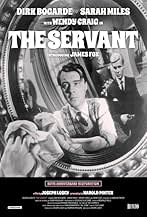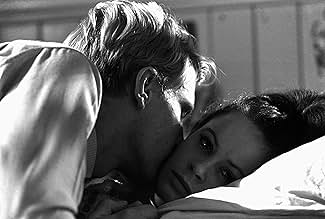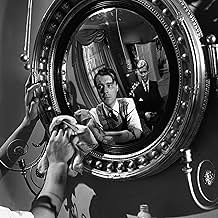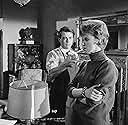IMDb-BEWERTUNG
7,8/10
15.217
IHRE BEWERTUNG
Tony aus der Oberschicht stellt den Diener Hugo Barrett ein, der, wie sich herausstellt, eine versteckte Absicht hat.Tony aus der Oberschicht stellt den Diener Hugo Barrett ein, der, wie sich herausstellt, eine versteckte Absicht hat.Tony aus der Oberschicht stellt den Diener Hugo Barrett ein, der, wie sich herausstellt, eine versteckte Absicht hat.
- 3 BAFTA Awards gewonnen
- 8 Gewinne & 11 Nominierungen insgesamt
Doris Nolan
- People in restaurant: Older Woman
- (as Doris Knox)
Empfohlene Bewertungen
The Servant is directed by Joseph Losey and adapted to screenplay by Harold Pinter from the novelette of the same name written by Robin Maugham. It stars Dirk Bogarde, Sarah Mles, Wendy Craig and James Fox. Music is by John Dankworth and cinematography by Douglas Slocombe.
When well-to-do Londoner Tony (Fox) hires Hugo Barrett (Bogarde) as his manservant, he gets more than he bargained for. Especially when Hugo's sister Vera (Miles) also arrives on the scene
The Servant remains as enigmatic today as it was back on its release in the early part of the 1960s. It's a film that defies classification, that rare old cinematic treat that continues to cause debate about not only its worth as art, but also its very meaning(s). A head bothering delight that revels in toying with your perceptions as much as Hugo Barrett enjoys toying with his supposed master. Lets play master and servant - indeed.
Set predominantly in the confines of Tony's swanky Chelsea abode, there's a disturbing claustrophobia that pervades the narrative, and this before we even begin to ponder the power of man, his ability to dominate and manipulate, or the reverse side that sees another's lack of ability to not succumb to the downward spiral instigated by a supposed lesser man.
Sprinkled over power issues are sexual desires, obtained, unfulfilled or simmering away unspoken. As the literate screenplay comes out in sharp dialogue snatches, breaking free of Pinter's other wise cement ensconced writing, there's evidence that this is a psychological study as opposed to the class system allegory that many thought it was way back then. This really isn't about role reversal, the finale tells us that.
Visually it's a box of atmospheric tricks as well. Losey and Slocombe use deep angular black and white photography to enforce the chilly dynamics at work in the story, the longer the film goes on, as it gets to the nitty gritty, the more jarring the camera work becomes – delightfully so – the house no longer an affluent person's residence, but a skew-whiff place of debauchery and mind transference. And mirrors - reflections, important and used to great effect.
Some scenes are striking and rich. Hugo at the top of the stairs standing in the bedroom doorway, in silhouette, an overhead shot of Hugo and Tony playing a childlike ball game on the stairs, a sex scene on a leather chair that we don't see but understand totally. And many more as Losey finds the material that allows him to show his skills.
Cast performances are across the board terrific, particularly Bogarde who gives a visual acting master class, and Fox who beautifully shifts a gear from toff twit into dependant dead beat. While Dankworth's musical accompaniments add flavour to the unfolding machinations. 9/10
When well-to-do Londoner Tony (Fox) hires Hugo Barrett (Bogarde) as his manservant, he gets more than he bargained for. Especially when Hugo's sister Vera (Miles) also arrives on the scene
The Servant remains as enigmatic today as it was back on its release in the early part of the 1960s. It's a film that defies classification, that rare old cinematic treat that continues to cause debate about not only its worth as art, but also its very meaning(s). A head bothering delight that revels in toying with your perceptions as much as Hugo Barrett enjoys toying with his supposed master. Lets play master and servant - indeed.
Set predominantly in the confines of Tony's swanky Chelsea abode, there's a disturbing claustrophobia that pervades the narrative, and this before we even begin to ponder the power of man, his ability to dominate and manipulate, or the reverse side that sees another's lack of ability to not succumb to the downward spiral instigated by a supposed lesser man.
Sprinkled over power issues are sexual desires, obtained, unfulfilled or simmering away unspoken. As the literate screenplay comes out in sharp dialogue snatches, breaking free of Pinter's other wise cement ensconced writing, there's evidence that this is a psychological study as opposed to the class system allegory that many thought it was way back then. This really isn't about role reversal, the finale tells us that.
Visually it's a box of atmospheric tricks as well. Losey and Slocombe use deep angular black and white photography to enforce the chilly dynamics at work in the story, the longer the film goes on, as it gets to the nitty gritty, the more jarring the camera work becomes – delightfully so – the house no longer an affluent person's residence, but a skew-whiff place of debauchery and mind transference. And mirrors - reflections, important and used to great effect.
Some scenes are striking and rich. Hugo at the top of the stairs standing in the bedroom doorway, in silhouette, an overhead shot of Hugo and Tony playing a childlike ball game on the stairs, a sex scene on a leather chair that we don't see but understand totally. And many more as Losey finds the material that allows him to show his skills.
Cast performances are across the board terrific, particularly Bogarde who gives a visual acting master class, and Fox who beautifully shifts a gear from toff twit into dependant dead beat. While Dankworth's musical accompaniments add flavour to the unfolding machinations. 9/10
The song ' All Gone ' is played periodically through the duration of ' The Servant ' and it somehow sums the whole thing up. The period of the early sixties are long since gone, but the class divisions remain for better or worse ( mainly worse ) and in that sense the film is entirely relevant to today. I have seen this film only twice in my life, but giving myself a Joseph Losey ' season ' as they used to do, once upon the time, on the UK's BBC, but that too seems to be gone, reminds me of what we have lost in the cinema. Is it one of Losey's best films ? With certain reservations I think it is, and the merciless depiction of so-called ' order ' disintegrating into ' disorder ' sticks to the mind like glue. Except for a few exterior shots of Chelsea and a snow bound countryside the claustrophobia of the house in which the drama plays is palpable. You need air after watching this and to call it a drama is a bit of an overstatement. It is half way Harold Pinter and half way Samuel Beckett. Everything happens, and nothing happens, and the perennial Jean-Paul Sartre's ' Huis Clos ' and Harold Pinter's theatrical work in general, plus Samuel Beckett's ' Waiting for Godot ' come to mind. A closed universe without escape. Society's divisions of class and the trap of human life in itself are clearly visible. I am reluctant to give any spoilers except to say a manservant overwhelms the master of a house, and the temptations of losing control are too overwhelming for the master to resist. James Fox is excellent as the master, too passive to fight back and Dirk Bogarde gives arguably his best performance as a slightly camp manservant, and the obvious ( to me ) bisexuality between them also binds them together. Women are ' used ' in this scenario and to a certain extent Wendy Craig loses her righteous dignity and Sarah Miles as Bogarde's accomplice sinks further and further into self-degradation. It is perfect casting and Losey knew exactly what he was doing in choosing the actors. A party scene played as if it is in a mortuary appears dated, but looked at closely and listened to attentively it is entropy exemplified. A woman in black appears to hand out drugs to keep the master in a perpetual coma, and the other women in the room can barely move never mind indulge in any sexual acts. To sum up Losey sees a world collapsing into its inevitable oblivion. We the viewers watch, and despite having little background information about the characters we can draw own conclusions about what we are seeing, and like the people in the film gaze into mirrors as the only moorings to reflect our existence. A must see film but is its pessimism too hard to bear ?
This is a superb, sinister movie of the very highest class. Unlike the character Tony (James Fox) who is upper class without being high class, if you get my drift. You cannot really sympathise with Tony, who toys with some high falutin' development projects but basically is a wastrel just waiting to be ponced off. Tony is a later-day Bertie Wooster. The sinister element comes from the servant (Dirk Bogarde), who is no Jeeves. Barrett, like Jeeves , is a gentleman's gentleman or valet (not a butler as suggested in some other comments on this film). Tony needs a valet because he is incapable of doing anything much without help. Barrett and his accomplice Vera (Sarah Miles) take Tony to the cleaners, sweeping aside the fiancee Susan (Wendy Craig) in their wake.
Harold Pinter has written the screenplay in similar vein to the superb movie The Accident, also a Losey piece, which I also commend. The cinematography in both movies is simply excellent. The subject matter of The Servant suits Pinter, although much of the screenplay is not really in Pinter's voice. However, there is one scene, set in a restaurant, which includes a tiny cameo by Pinter himself and which contains a short Pinteresque exchange between two women. There is also one tense exchange between Susan and Barrett "do you wear deodorant" etc. which is very reminiscent of a scene in The Caretaker "you stink from arsehole to Thursday" etc. Indeed the story of The Servant resembles The Caretaker in many respects, except that in The Servant the interloper, Barrett, is on top and stays there, whereas in The Caretaker the interloper, Davies, lacks the skill and circumstances to dislodge the incumbent.
There is a homoerotic undercurrent to the film and this works so well because it is an undercurrent (in 1963 there could have been no more than an undercurrent even if they had wanted more). The overt debauchery with Vera and the orgy party towards the end of the film is the only bit of the film that has aged without grace. But I quibble.
This is a truly great film and it deserves to be more widely known.
Harold Pinter has written the screenplay in similar vein to the superb movie The Accident, also a Losey piece, which I also commend. The cinematography in both movies is simply excellent. The subject matter of The Servant suits Pinter, although much of the screenplay is not really in Pinter's voice. However, there is one scene, set in a restaurant, which includes a tiny cameo by Pinter himself and which contains a short Pinteresque exchange between two women. There is also one tense exchange between Susan and Barrett "do you wear deodorant" etc. which is very reminiscent of a scene in The Caretaker "you stink from arsehole to Thursday" etc. Indeed the story of The Servant resembles The Caretaker in many respects, except that in The Servant the interloper, Barrett, is on top and stays there, whereas in The Caretaker the interloper, Davies, lacks the skill and circumstances to dislodge the incumbent.
There is a homoerotic undercurrent to the film and this works so well because it is an undercurrent (in 1963 there could have been no more than an undercurrent even if they had wanted more). The overt debauchery with Vera and the orgy party towards the end of the film is the only bit of the film that has aged without grace. But I quibble.
This is a truly great film and it deserves to be more widely known.
An intimately crafted psychological drama, The Servant is a remarkable film that deserves to be seen by all. Written by Harold Pinter, based on a novel by Robin Maugham, it is a stunningly intelligent dissection of two men, the upper crust Tony (James Fox) and his new servant, Hugo Barrett (Dirk Bogarde). Through these two characters, Pinter's script unravels sharp ups and downs of class warfare and sexual games, as the two men constantly play a tug of war for power in all forms. When they first meet the two seem to hit it off quite well, falling comfortably into their positions of servant and master.
However, once Tony's fiancée Susan (Wendy Craig) comes into the mix and disapproves of Barrett, things start to become more conflicted. Then, Barrett's "sister" Vera (Sarah Miles) comes to move in and her true nature, as Barrett's lover, throws an even stronger rift between the two and their class positioning. The intrusion of these women sets off a descent from their idyllic lifestyle and the two men spend the rest of the time clashing with one another, the walls slowly closing in on this gripping and powerful study.
Director Joseph Losey makes great work of his tools here, using a lot of unique camera techniques like splitting the focus and viewing the characters through reflective surfaces rather than directly, which all serve to heighten the already high tension. The structure is bizarre and the final act gets surprisingly dark and borderline surreal, as the two engage in a series of fascinating interactions to further dissect the state of their dynamic. The Servant would be absolutely nothing without the performances of it's two men, and they both deliver in equal measures. The women are both superb as well, Craig being sharp and vicious, Miles being naive and sensual, but it's the boys show all the way through.
Bogarde is breathtaking, convincingly portraying the "gentleman's gentleman" of a butler at first but slowly turning more sinister and terrifying as time passes on. He plays all sides of this character with total life, always remaining a mystery to the audience as we are never sure whether he is fooling Tony and us or if he's being sincere at any given moment. There's a scene between him and Susan where she digs into him and the pain on his face, the emasculation, actually allows the viewer to feel deeply for what could have been a very unlikeable character.
Fox is no dull edge either, meeting Bogarde with a heartbreaking descent, falling from the mannered and composed young man we first meet into the shriveled and destroyed wreck by the end. The shifting dynamics between the two are always engaging, and Pinter embeds the film with just the right amount of emotion, comedy, terror and homoerotic subtext. It's a shattering work, marvelously performed by everyone involved.
However, once Tony's fiancée Susan (Wendy Craig) comes into the mix and disapproves of Barrett, things start to become more conflicted. Then, Barrett's "sister" Vera (Sarah Miles) comes to move in and her true nature, as Barrett's lover, throws an even stronger rift between the two and their class positioning. The intrusion of these women sets off a descent from their idyllic lifestyle and the two men spend the rest of the time clashing with one another, the walls slowly closing in on this gripping and powerful study.
Director Joseph Losey makes great work of his tools here, using a lot of unique camera techniques like splitting the focus and viewing the characters through reflective surfaces rather than directly, which all serve to heighten the already high tension. The structure is bizarre and the final act gets surprisingly dark and borderline surreal, as the two engage in a series of fascinating interactions to further dissect the state of their dynamic. The Servant would be absolutely nothing without the performances of it's two men, and they both deliver in equal measures. The women are both superb as well, Craig being sharp and vicious, Miles being naive and sensual, but it's the boys show all the way through.
Bogarde is breathtaking, convincingly portraying the "gentleman's gentleman" of a butler at first but slowly turning more sinister and terrifying as time passes on. He plays all sides of this character with total life, always remaining a mystery to the audience as we are never sure whether he is fooling Tony and us or if he's being sincere at any given moment. There's a scene between him and Susan where she digs into him and the pain on his face, the emasculation, actually allows the viewer to feel deeply for what could have been a very unlikeable character.
Fox is no dull edge either, meeting Bogarde with a heartbreaking descent, falling from the mannered and composed young man we first meet into the shriveled and destroyed wreck by the end. The shifting dynamics between the two are always engaging, and Pinter embeds the film with just the right amount of emotion, comedy, terror and homoerotic subtext. It's a shattering work, marvelously performed by everyone involved.
If you watch closely you will find that not only does the internal decoration of the house change (in ways not included in the plot) to become gradually darker as Tony is gradually undermined and seduced by Barrett but also the excellent (but very much of its time) soundtrack by Johnny Dankworth & (surely - or is my recollection wrong?) Cleo Laine - though the same LP is put on the turntable many times, the arrangement of the same theme is different. (I did not notice this at first but found it pointed out in a special issue of the Oxford University magazine Isis at the time the film was released that was entirely devoted to it.) The film has recently reappeared in England as a stage work: Play without Words, seen at the National Theatre, is (was, I guess, is more accurate) a superb piece of dance theatre in which the ambiguities of the characters' motivations, or the discrepancies between their thoughts and actions, are portrayed by having more than one dancer per character. Sometimes only one is seen, sometimes they move in unison, sometimes in separate ways. It is extremely effective.
Wusstest du schon
- WissenswertesWhen producer and director Joseph Losey was hospitalized with a brutal case of pneumonia for two weeks during this shoot, Dirk Bogarde continued filming assisted by minute, daily instructions over the phone from Losey's hospital bed. When Losey returned to the set, he did not re-shoot any of the script, much to the relief of cast and crew. Bogarde managed to keep the film on schedule, though he later said the experience made him determined never to direct.
- PatzerWhen Tony and Susan arrive at Tony's house in the Mercedes, with an extended visit in mind, they both go into the house and Tony leaves the car's lights on.
- Zitate
Hugo Barrett: I'll tell you what I am. I'm a gentleman's gentleman, and you're no bloody GENTLEMAN!
- VerbindungenFeatured in Stairs (1986)
Top-Auswahl
Melde dich zum Bewerten an und greife auf die Watchlist für personalisierte Empfehlungen zu.
- How long is The Servant?Powered by Alexa
Details
- Erscheinungsdatum
- Herkunftsland
- Sprache
- Auch bekannt als
- El sirviente
- Drehorte
- Produktionsfirma
- Weitere beteiligte Unternehmen bei IMDbPro anzeigen
Box Office
- Bruttoertrag in den USA und Kanada
- 45.522 $
- Eröffnungswochenende in den USA und in Kanada
- 7.859 $
- 28. Juli 2013
- Weltweiter Bruttoertrag
- 76.945 $
- Laufzeit
- 1 Std. 56 Min.(116 min)
- Farbe
- Seitenverhältnis
- 1.66 : 1
Zu dieser Seite beitragen
Bearbeitung vorschlagen oder fehlenden Inhalt hinzufügen


































